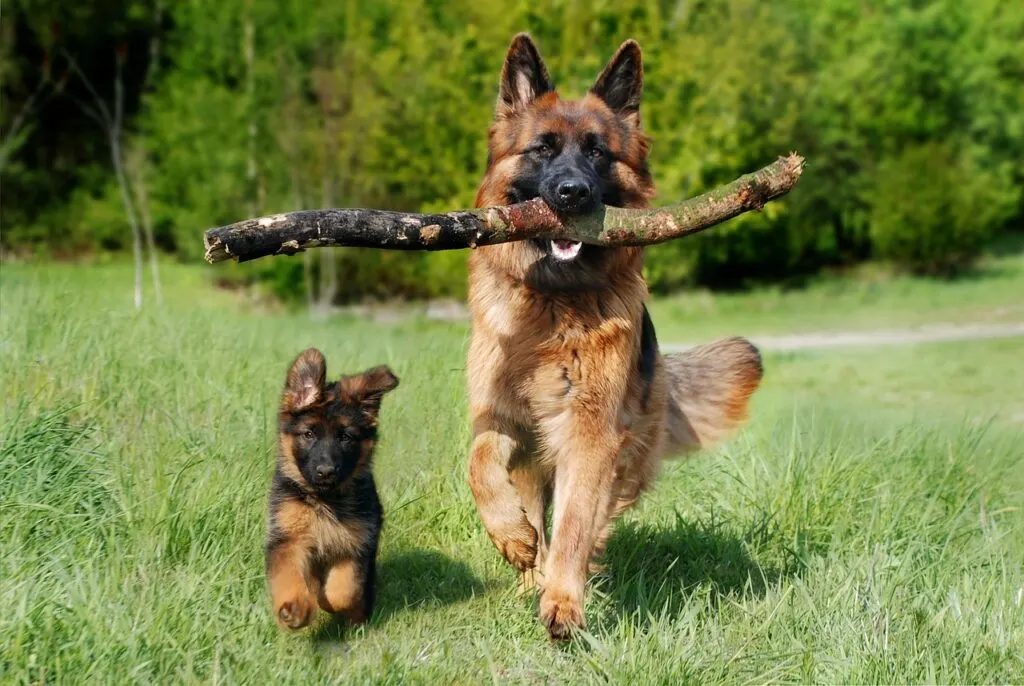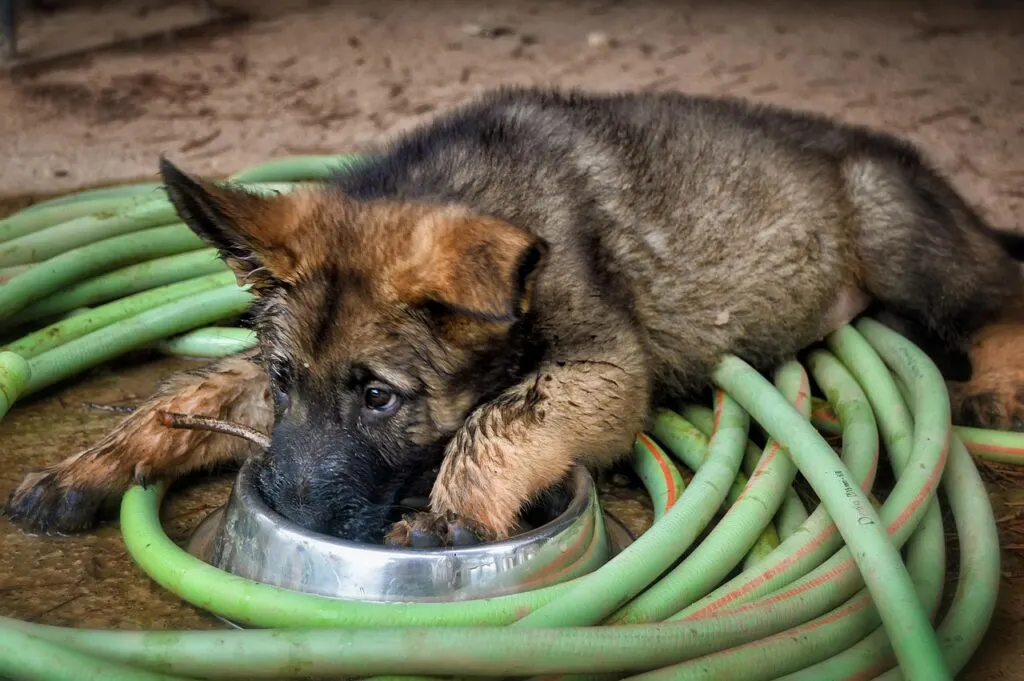Nutritional Tips for Large Breed Dogs
Owning a big dog comes with big responsibilities. One of those is feeding your furry friend the right food.
To keep your pet companion healthy and happy, providing them with balanced nutrition is crucial. However, it can prove to be more challenging than you expected.
Each dog breed has unique nutritional requirements that must be met. Otherwise, your dog may experience a wide range of issues, such as low energy levels, digestive problems, and obesity.
Below, we present what ingredients your dog needs to eat to stay in shape. We also list the best dog foods for large breeds and answer how much food they need on a daily basis.
Let’s get started.
Key Takeaways
- Due to their size and growth rate, large-breed dogs and pups have different nutritional needs than smaller dogs.
- Dietary requirements may vary depending on the dog’s age and life stage, with large-breed pups requiring more protein and fat.
- The best dog food for large-breed dogs is rich in protein, carbohydrates, fats, vitamins, and minerals.
- Giant breed pups should consume diets rich in protein, calcium, and phosphorus to support the development of their skeletal system.
Nutritional Requirements According to Life Stage
The nutritional concerns of large or giant breed dogs depend on their age and life stage. Puppies, adults, and seniors benefit from different diets. The same goes for pregnant and lactating dogs.
The Association of American Feed Control Officials (AAFCO) sets the minimum requirements for pet food to ensure it meets their nutritional needs.
The table below shows how much protein and fat you should include in your dog’s diet based on its recommendations.
| Life Stage | Protein (Minimum) | Fat (Minimum) |
|---|---|---|
| Gestation/Lactation | 22% | 8% |
| Puppy | 22% | 8% |
| Adult | 18% | 5% |
To simplify things, here’s what you should know:
- Large breed puppies and pregnant or lactating female dogs require a minimum of 22% protein and 8% fat.
- Adult dogs, on the other hand, need a minimum of 18% protein and 5% fat.
What Are the Nutritional Requirements of Large Breed Adult Dogs?

Large or giant dog breeds have specific nutritional needs that must be met to support their growth, development, and overall health. A balanced diet is crucial for these dogs, providing them with the necessary nutrients they need to grow strong and healthy.
The most critical aspect is ensuring they receive the right amounts of protein, carbohydrates, fats, vitamins, and minerals. These nutrients are essential for their energy levels and immune system.
If an adult large dog’s nutritional needs are not met, it can have detrimental effects on their health. They may experience slower growth, bone problems, poor joint health, and obesity.
Therefore, providing them with proper nutrition from an early age is paramount.
Protein
Protein is essential for adult large-breed dog nutrition because it supplies them with the necessary amino acids to build hair, skin, and nails.
Adequate protein intake also helps maintain muscle mass, supporting bone health and proper immune function.
If you want your four-legged friend to have healthy muscles, tendons, and ligaments, you better find high-quality protein sources for your pup.
Fats
As energy-dense nutrients, fats are a valuable source of energy for large- and giant-breed dogs. They also play a significant role in keeping your dog’s skin and coat healthy. The right amount of dietary fat ensures their skin remains supple and their coat remains shiny and lustrous.
Carbohydrates
Many large breed dogs have high activity levels and require a lot of fuel and energy. Carbohydrates are the element that can help them stay active and healthy. They provide a readily available source of energy for your four-legged companions.
When choosing carbohydrate sources for your large breed dog’s food, opt for good quality food sources like whole grains, vegetables, and fruits.
Vitamins and Minerals
Ensuring your pet gets essential vitamins and minerals is crucial for a balanced diet. These components are not just additions to their meals. They play significant roles in maintaining the overall health of our beloved dogs.
Vitamins and minerals are vital for various bodily functions. They aid in digestion, bone development, and muscle formation. For instance, Vitamin A promotes good vision, while calcium helps with bone health.
When preparing your dog’s diet, remember to include those vital nutrients. Doing so ensures they live a healthy, active, and long life.
Water
Just like humans, dogs need water to survive and maintain a healthy, functioning body.
One of the main benefits of water is its contribution to digestion. It aids in the breakdown of food, making it easier for your furry friend to absorb nutrients.
On top of that, water is crucial when it comes to circulation. It acts as the body’s transport system, carrying essential nutrients around the body and removing waste.
Always ensure your dog is drinking enough clean water at all times.
How Much Food Should I Feed Large and Giant Breed Dogs?
The amount of food you should feed your dog depends on their age, weight, activity level, and overall health.
Generally, it’s best to feed your large dog about 3 cups a day, each containing no more than 350 calories.
As your pet’s weight increases, so should their food intake. For example, for a dog that weighs 100 pounds, you should increase their daily servings to 4 ½ cups.
Highly active large dogs such as German Shepherds will require at least 1750 to 2100 calories daily.
If you’re still unsure how much food to give your pet, consult your veterinarian. They will help you determine the appropriate portion size for your dog.
What Is the Best Large Breed Dog Food?
When choosing the best dog food for large breeds, search for products that are specially formulated for them. Buy only from companies that take great care in sourcing their materials.
The foods you purchase should originate from entirely organic and natural substances. At the same time, avoid dog foods that include fillers or artificial additives, as they do not provide the necessary nutrients and can be harmful to your dog’s health.
What Are the Specific Nutritional Needs for Large and Giant Breed Puppies?

Large and giant breed puppies have specific nutritional needs that must be met to ensure their proper growth and development.
One important consideration is maintaining balanced calcium and phosphorus levels in their diet. These minerals play a crucial role in supporting healthy bone and joint development.
In addition to calcium and phosphorus, it is crucial to calculate the ideal protein and calorie balance for large and giant breed puppies.
Healthy bones require several crucial nutrients. Among these are Vitamin D, Vitamin A, copper, zinc, and manganese. Any deficiency or excess of these vital elements can lead to abnormal orthopedic development.
Large breed puppies do best when fed a mix of kibble and wet food. Fat content should be lower compared to other breeds.
How Much Food Should I Feed My Large Breed Puppy?
Feeding your large breed puppy the right amount of food is crucial for their healthy development. Remember that their growth should be gradual to prevent any issues later in life.
The portion sizes for your large breed puppy can vary based on their age, weight, and activity level. It’s best to consult your veterinarian, who can guide you on the appropriate portion sizes for your puppy.
When calculating the portion sizes, consider the dietary considerations for large-breed puppy growth. These puppies require a diet that is balanced in terms of protein, fat, and carbohydrates. They also need adequate amounts of calcium and phosphorus to support healthy bone and joint development.
What Is the Best Puppy Food for Large Breed Pups?
Unlike adult dogs and small breeds, large-breed pups have unique nutritional needs because of their fast growth rate and development. These four-legged furballs experience rapid growth, especially during the first few months of their life. Consequently, they require foods with special large breed formula for puppies that supports their growth and development.
Large breed pups should consume puppy food rich in protein, vitamins, and minerals. These nutrients are crucial for the proper development of their skeletal system.
However, it is important to remember that giant breed pups should consume only the right amount of food. Being overfed and growing too quickly can put excessive stress on their joints and bones. Diet and portion control are essential in managing their growth rate and preventing potential health problems.
Final Thoughts
Giving proper nutrition to large and giant breed dogs is critical to keep them healthy and happy for many years to come. Pet owners must be mindful of the unique dietary needs of these pups due to their size and growth rate.
For large and giant breed pups, a diet rich in high-quality protein and balanced nutrients is vital to support their rapid growth and development. Controlled caloric intake is also crucial to preventing excessive weight gain and potential joint issues.
As large-breed adults, these dogs still need a balanced diet with enough protein, fats, and carbohydrates to support their energy levels, muscle maintenance, and overall health.
An imbalanced diet can be detrimental to healthy growth and result in different health problems.
It’s best to consult with a vet to create a nutrition plan that suits your dog’s individual needs and life stage.



















